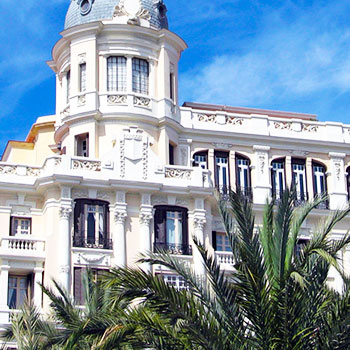Architectural Projects V
Liberal Arts, Business & Sciences Program
Alicante, Spain
Dates: 1/25/17 - 5/25/17

Architectural Projects V
OVERVIEW
CEA CAPA Partner Institution: University of Alicante
Location: Alicante, Spain
Primary Subject Area: Architecture
Instruction in: English
Transcript Source: TBD
Recommended Semester Credits: 6
Contact Hours: 120
Prerequisites: Architectural Projects III
Fee: $740.00
Fee Description:This course requires payment of an additional fee to cover components that are above and beyond typical course costs.
DESCRIPTION
Unit 1: CREATIVITY AND EMOTIONAL LEARNING
The personal experience contains all the information needed to articulate creative processes. The desire is articulated in the configuration of that creativity, something not rehearsal very often. The risk is a fundamental element in every design process, and it is anchored in experience and desire, where it finds its fundament.
In this way the student will approach the architectural design, from the path Experience/Desire/Risk.
There are two fundamental ingredients: To understand the project as an activity with strong links to creativity, and to understand the pedagogic processes as vital process of a long personal engagement.
Unit 2: CULTURE AND TECHNIQUE OF THE ARCHITECTURAL DESIGN
Different individual creativities, with the aim of applying on our reality, have produced a common base of knowledge. We refer to it as the culture of the project.
To interweave a personal relationship under this common structure of learning will allow us to face questions as the collective work or the social innovation.
In a parallel way, the complexity in the methodology of the architectonic design requires a development of the techniques of approach, management, and production of the information that are constantly under revision and actualization.
The knowledge and use of both is one of the keys of the production of innovation and the shared knowledge.
UNIT 3: SUSTAINABILITY AND INNOVATION
The sustainability cannot be longer considered an extra to the human activities. The architectural design must aspire to establish a sustainable negotiation with the future.
In a similar way, innovation is not the last step in any cognitive research, but the special way of contemporary knowledge. Knowledge is innovation or it is not knowledge.
Innovation and sustainability are not close axioms, but collective cognitive researches. Both require plural and complex approaches, creative and risky, for the ambitious design of a better future.
Course will consist of 120 hrs of in class work and 180 hrs of independent work outside the classroom.
The personal experience contains all the information needed to articulate creative processes. The desire is articulated in the configuration of that creativity, something not rehearsal very often. The risk is a fundamental element in every design process, and it is anchored in experience and desire, where it finds its fundament.
In this way the student will approach the architectural design, from the path Experience/Desire/Risk.
There are two fundamental ingredients: To understand the project as an activity with strong links to creativity, and to understand the pedagogic processes as vital process of a long personal engagement.
Unit 2: CULTURE AND TECHNIQUE OF THE ARCHITECTURAL DESIGN
Different individual creativities, with the aim of applying on our reality, have produced a common base of knowledge. We refer to it as the culture of the project.
To interweave a personal relationship under this common structure of learning will allow us to face questions as the collective work or the social innovation.
In a parallel way, the complexity in the methodology of the architectonic design requires a development of the techniques of approach, management, and production of the information that are constantly under revision and actualization.
The knowledge and use of both is one of the keys of the production of innovation and the shared knowledge.
UNIT 3: SUSTAINABILITY AND INNOVATION
The sustainability cannot be longer considered an extra to the human activities. The architectural design must aspire to establish a sustainable negotiation with the future.
In a similar way, innovation is not the last step in any cognitive research, but the special way of contemporary knowledge. Knowledge is innovation or it is not knowledge.
Innovation and sustainability are not close axioms, but collective cognitive researches. Both require plural and complex approaches, creative and risky, for the ambitious design of a better future.
Course will consist of 120 hrs of in class work and 180 hrs of independent work outside the classroom.










